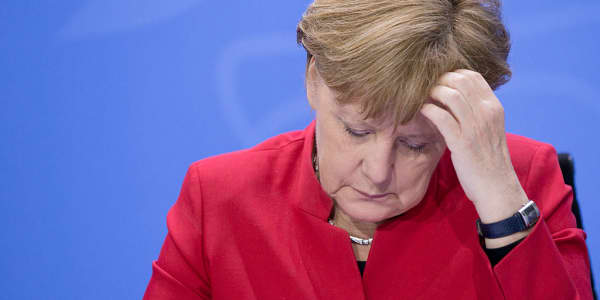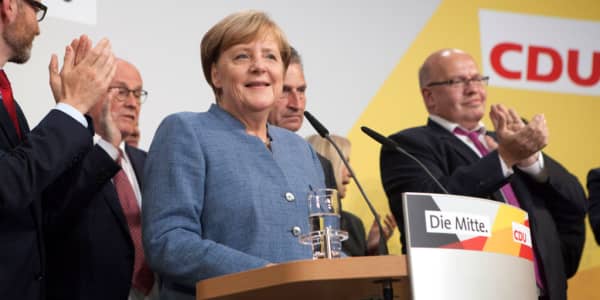Angela Merkel is likely to win a fourth term as chancellor after a national election on Sunday but business leaders are already warning her that the next government must implement growth-friendly policies to ensure Germany remains the euro zone's largest economy.
Steffen Kampeter, director general of the Confederation of German Employers' Associations (BDA), told CNBC on Wednesday that Germany needed to stay in the "Champions League", referring to the soccer competition which sees top-division European clubs compete.
"We are in the Champions League at the moment that's quite clear, but we need a political surrounding that makes sure we stay in the Champions League, that will be the task for the four new years of the government."

"Our clear perception is that for the next four years we need a more growth-friendly and more business-orientated policy. We have challenges (in terms of) demographics, the stability of the social security system and we feel the disruption from the industrial production from new competitors in Asia and elsewhere."
Germany is traditionally seen as the growth engine in Europe although, with its current account surplus (amassed through a buoyant, export-heavy economy), it has long been accused of not encouraging enough household spending and consumption, and a lack of domestic investment.
In the second quarter, however, the country's 0.6 percent quarter-on-quarter growth was driven by strong household spending and government expenditure, according to the Federal Statistics Office, and a substantial increase in imports which outstripped exports.
On the whole, German voters are pleased with Angela Merkel's record in government although her recent policies over immigration – Germany allowed 1 million mainly Syrian refugees to enter the country during the region's refugee crisis in 2015 – has pushed some voters towards the right-wing Alternative for Germany (AfD) party.
Ahead of Sunday's election, the latest opinion poll by the Frankfurter Allgemeine Zeitung newspaper on Tuesday showed Merkel's conservative alliance of the Christian Democrats and its sister Christian Union party (CDU-CSU) with 36.5 percent of the vote, followed by her main rivals, the SPD with 22 percent of the vote.
In third place was the anti-immigration AfD party on 10 percent, the poll conducted by Allensbach showed the business-friendly Free Democrats (FDP) with 11 percent of the vote and the Greens with 8 percent. The Greens and FDP are predicted to be the most likely coalition partners with Merkel's CDU-CSU.
Speaking to German broadcaster RTL on Tuesday, Merkel said she was "not thinking about any coalitions now."
"I have said that we will not form a coalition with the AfD, we will also not form a coalition with the Left, and apart from that we are working on a good election results for the CDU and the CSU."

Marcel Fratzscher, president of the German Institute for Economic Research (DIW Berlin), told CNBC on Tuesday that the legacy question facing Angela Merkel was whether she could turn Germany, in the next four years, "into an open society that is integrating not just refugees but a lot of Europeans that have come to Germany in the last few years into the labor market, into society."






